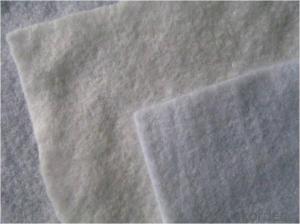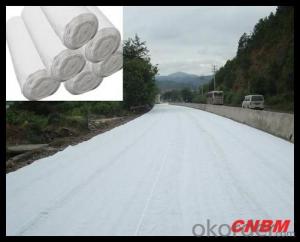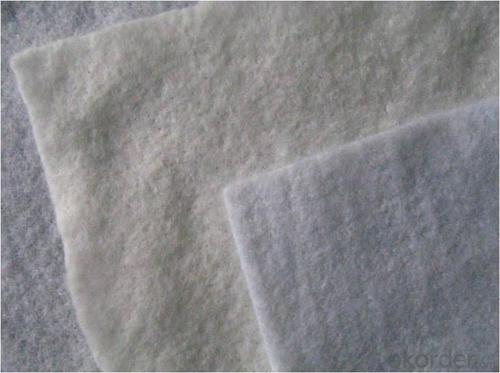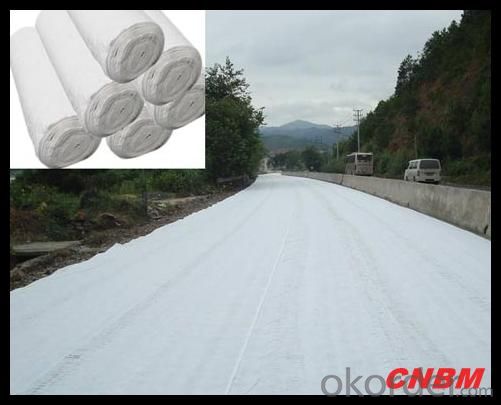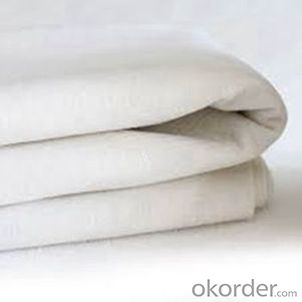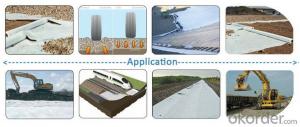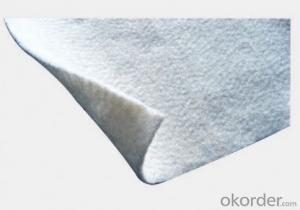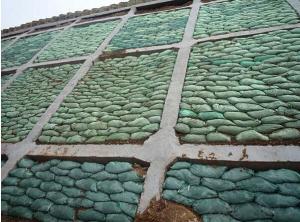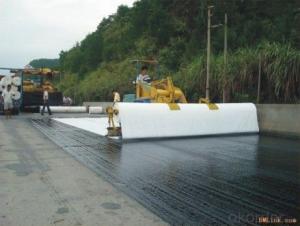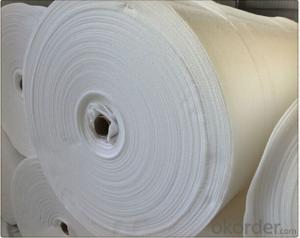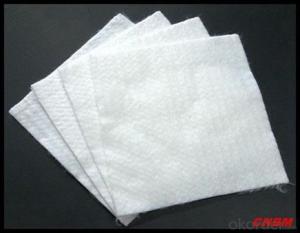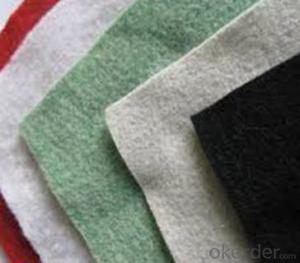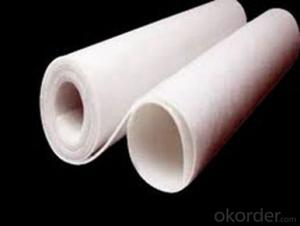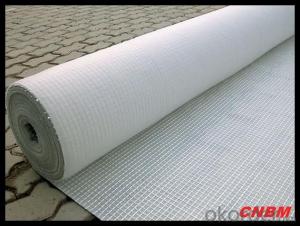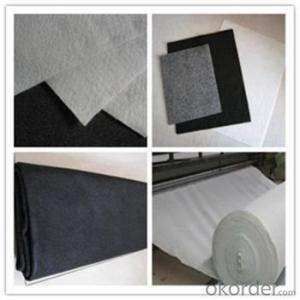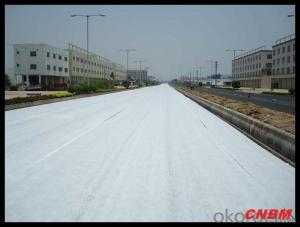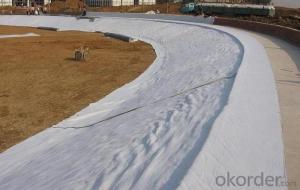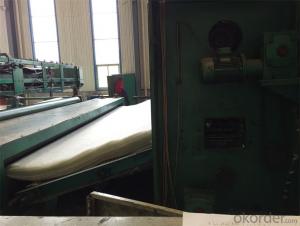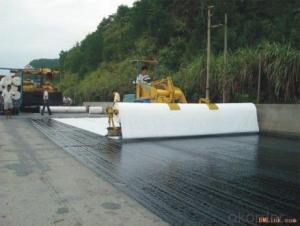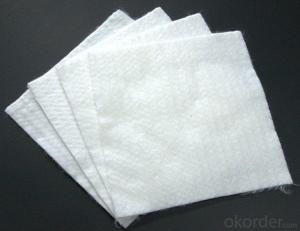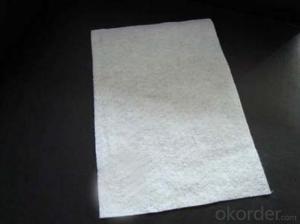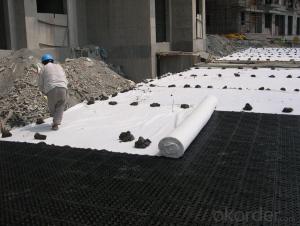200W Filament Non-Woven Geotextile for Reinforcement and Drainage from CNBM China
- Loading Port:
- China main port
- Payment Terms:
- TT OR LC
- Min Order Qty:
- 3000 g/m²
- Supply Capability:
- 1000000 g/m²/month
OKorder Service Pledge
OKorder Financial Service
You Might Also Like
Specification
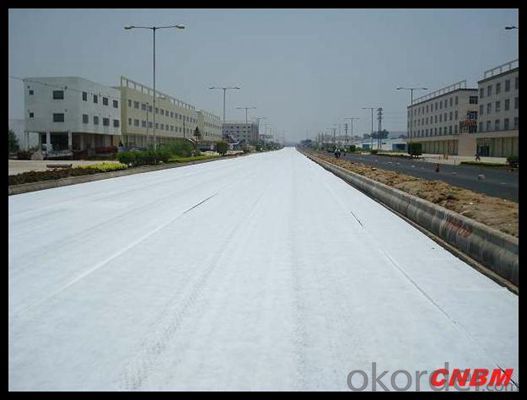
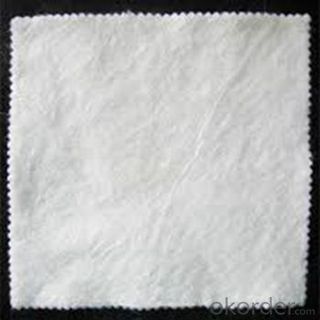
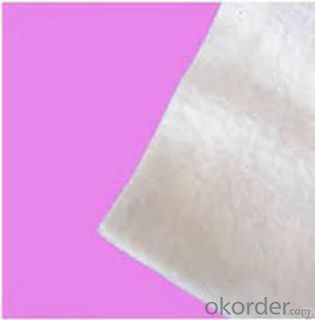
Application of geotextile
Filtration
It can be the filtration layer of the dykes, river canal, seacoast, concrete slope, retaining walls. At the same time of preventing the clay granule from passing, it allows the water and the gas pass through freely.
Separation
The isolation of the railway dregs and the roadbed, roadbed and the soft base, surface of the airdrome and parking lot and the groundsill, different dam materials. It isolates the soil and the gravel of two kinds different
granule pathway from the groundsill or other buildings.
Reinforcement
The highway, railway, soil-stone dam, breakwater, airport, backfill soil of retaining wall, slope protection, etc in which distributes the earth stress, prevents the side-displacement of the earth body and improves the earthbody stability.
Protection
It prevents the bank from being washed out, protects the bank and the
bottom, prevents the water and soil from being washed away.
After-sales service
1.In order to provide customers with comprehensive technical support,we will provide technical and other related information upon request in a timely manner.
2.In required,we will appoint specialized technicians to the construction site to give technical trainings to construction people,and offer technical guidance throughout the whole construction process.
3.For damage due to shipment and delivery,after we receive the complaint,we will check the issure through provided pictures and videos.If our responsibility is confirmed,we wil offer free replacement.
4.When the construction is completed,as your request,our technical staff may participate in the final acceptance.
FAQ:
Q: What kind of payments does jenor support?
A: T/T, L/C, Cash are accepted.
Q: Do you charge for the samples?
A: Accordeing to our company policy, the samples are free, we only charge the freight fee. And we will return the freight fee during the next order.
Q: Can you produce according to customers' design?
A: Sure, we are professional manufacturer, OEM and ODM are both welcome.
Q: Do you have other products?
A: Yes, please check the pictures:
- Q: Fish tank white filter cotton toxic, is not geotextile, or non-woven Yeah
- No toxic, geotextile and non-woven raw materials are polyester, chemical name PET, its normal situation is not toxic, if the heating temperature reaches 117 degrees, will precipitate some chemical substances, when the fish may have an impact. But your water temperature will not reach 117 degrees, unless you want to drink fish soup, so there is no problem
- Q: What is the expected lifespan of geotextiles?
- The expected lifespan of geotextiles can vary depending on factors such as the quality of the material, the specific application, and the environmental conditions. However, on average, geotextiles are designed to have a lifespan of 20-30 years.
- Q: How are geotextiles affected by moisture content?
- Geotextiles are significantly affected by moisture content as they can either retain moisture or allow it to pass through. The amount of moisture present influences their physical properties such as strength, permeability, and durability. If exposed to excessive moisture, geotextiles may lose their effectiveness and become prone to degradation or failure. Conversely, proper drainage and moisture control can enhance their performance and longevity.
- Q: Hope expert expert to give the answer
- 1, side ditch, drains, blind ditch, cut ditch are road drainage facilities. 2, the drainage system is divided into the form of surface water and row of groundwater. Row of surface water: side ditch, drains, cut ditch; row of groundwater: blind ditch. 3, according to the road plane position is divided into: side ditch in the road side; drains can also be in the road side in the central zone; trench in the cutting section above; blind ditch in the roadbed width range. 4, according to the direction of the road is divided into: the direction of the ditch along the way; drains can also be the direction of the road can also cross the direction; cut the ditch along the way; blind ditch can be any direction. 5, according to the drainage function and cross-sectional size is divided into: drainage section of the largest; blind ditch second; side ditch, cut the smallest ditch. 6, according to the construction materials can be divided into: ditch can be pulp, dry piling, ramming, etc .; drains for the pulp or dry puzzle; blind ditch for the dry, pulp, gravel, concrete, ) And other combinations; cut ditch for the dry, pulp, ramming and so on. 7, according to the embankment type is divided into: fill, fill in the dug with a ditch, ditch, blind ditch; digging side, half filled half digging section ditch, drains, blind ditch, The ditch appears only in the digging section.
- Q: What are the key considerations for geotextile installation in areas with high seismic activity?
- When installing geotextiles in areas with high seismic activity, there are several key considerations that need to be taken into account. Firstly, the geotextiles should be designed to withstand the ground movements and vibrations caused by earthquakes. This may involve using geotextiles with high tensile strength and puncture resistance. Secondly, proper anchoring and securing techniques should be employed to ensure that the geotextiles remain in place during seismic events. This may include using appropriate fixing methods such as soil nails or ground anchors. Additionally, the selection of geotextile materials should consider their ability to resist degradation caused by the cyclic loading and ground movements associated with earthquakes. Overall, the key considerations for geotextile installation in areas with high seismic activity involve designing for seismic forces, securing the geotextiles effectively, and choosing durable materials that can withstand the effects of earthquakes.
- Q: How do geotextiles help with asphalt overlay?
- Geotextiles help with asphalt overlay by providing a stable and durable base for the new asphalt layer. They act as a barrier, preventing the mixing of the new asphalt with the existing pavement, which improves the overall strength and performance of the overlay. Additionally, geotextiles help in reducing reflective cracking and extending the lifespan of the asphalt overlay by distributing the load and reducing stresses on the pavement.
- Q: Can geotextiles be used for reinforcement of foundations?
- Yes, geotextiles can be used for reinforcement of foundations. Geotextiles are often used as a separation layer between the soil and the foundation, preventing the mixing of different soil layers and enhancing the stability of the foundation. Additionally, geotextiles can also provide reinforcement by distributing the load from the foundation more evenly, reducing settlement and improving overall foundation performance.
- Q: Manufacture of geotextile machinery
- Non-woven needle machine, I am specializing in the production of geotextiles
- Q: Can geotextiles be used for reinforcement of pipeline trenches?
- Yes, geotextiles can be used for the reinforcement of pipeline trenches. They provide stability and support by preventing soil erosion and minimizing the movement of soil particles. Additionally, geotextiles can enhance the overall performance and longevity of the pipeline by reducing stress on the pipes and preventing damage caused by shifting soil.
- Q: Mainly how to filter layer construction, cutting for the weak weathering rock
- The walls behind the sandbags ah, but in most cases are mechanical backfill, and then the top surface of a layer of sandbags and composite drainage network mean
Send your message to us
200W Filament Non-Woven Geotextile for Reinforcement and Drainage from CNBM China
- Loading Port:
- China main port
- Payment Terms:
- TT OR LC
- Min Order Qty:
- 3000 g/m²
- Supply Capability:
- 1000000 g/m²/month
OKorder Service Pledge
OKorder Financial Service
Similar products
Hot products
Hot Searches
Related keywords
